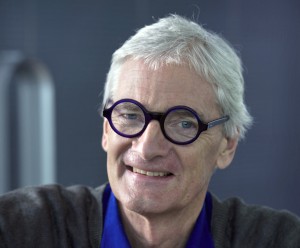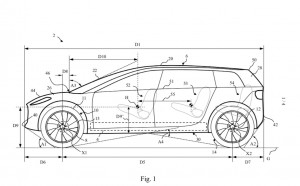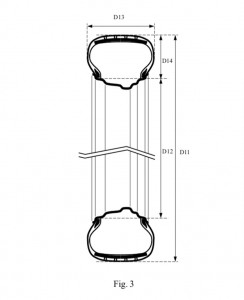
James Dyson, creator of the top-selling vacuum, has moved another step closer to producing his electric vehicle.
It’s best known for its distinctive vacuums and, perhaps, for the hand-dryers popping up in public restrooms around the world, but Britain’s Dyson Ltd. now wants to become a major player in the battery-car market.
The company today released copies of several new patents it has been awarded that provide a good glimpse of what it’s working on: a long three-row crossover with only a vestigial engine compartment and its batteries and motors mounted below the floorboards.
In reality, the British inventor told employees in an e-mail that the images in the patents “don’t reveal what our vehicle will really look like or give any specifics around what it will do.” Nonetheless, Dyson added that the patents do “provide a glimpse of some of the inventive steps” that will be incorporated in the company’s upcoming electric vehicles.
The e-mail was short on specifics but did give a glimmer of the thinking behind the project.
(Dyson confirms plans to build EV at Singapore plant. Click Here for the story.)
“Significantly, many of our competitors base their electric vehicles on existing formats and adapt them for electric propulsion systems,” Dyson wrote. “Such an approach is cost effective, however, it tends to miss opportunities for mass-reduction and aerodynamic improvements which would improve the energy efficiency of the vehicle. Another approach has been to focus on smaller vehicles, as this generally keeps the mass of the vehicle low which can extend driving range. However, the size and ride comfort of such vehicles tends to limit their attractiveness and utility.”
Rumors of a Dyson car have been surfacing since at least 2015, when the UK manufacturer purchased Ann Arbor, Michigan-based Sakti3. That spinoff from the University of Michigan was developing a breakthrough solid-state battery that could be useful for the cordless vacuums Dyson sells, but they were also seen as a way to leapfrog existing lithium-ion technology for automobiles.
Some began to question whether Dyson was pulling back when it effectively wrote off the Sakti3 investment a couple years later, but the patents show that, if anything, the company’s efforts are accelerating.
In that e-mail to Dyson staff, the company founder said that testing of the vehicles under development would accelerate next month. And he noted that there already are 500 people assigned to the program.
Reports that surfaced last year suggest that Dyson has three different battery-electric vehicles, or BEVs, under development. Plans call for production at a plant in Singapore, CEO Jim Rowan told employees in a letter last November.
“Singapore has a comparatively high cost base, but also great technology expertise and focus,” he explained. “It is therefore the right place to make high quality technology loaded machines, and the right place to make our electric vehicle.”
(Click Here for more about the push for solid-state batteries.)
For his part, James Dyson has indicated that production would begin by 2021. The company reportedly plans to set up its own dealer network. But it is not clear where it plans to market its new vehicle line-up.
Separately, Dyson told the Financial Times that the company has already lined up a major tire manufacturer. Dyson appears to be leaning towards using larger wheels and tires than found on many earlier electric vehicles, a move meant to both enhance appearance and ride comfort.
“I’ve long been fascinated by wheels,” he said in his e-mail.
Dyson has said he was willing to spend as much as $1 billion just on a battery plant. But it is not clear what form of batteries the vehicles will use. The British firm purchased Sakti3 for £58 million, but last year wrote off £46 million, or about $60 million, of that due to problems with the technology. Proponents believe that solid-state batteries eventually will offer longer range, faster charging and lower costs. But they still don’t work well outside the research lab and it remains uncertain if, or when, they will be ready for mass production.
The automotive project, founder Dyson has indicated, will cost around $2.7 billion. About $260 million of that is expected to be spent in the UK on R&D, as well as a vehicle test track. The project is currently centered at the old RAF base at Hullavington Airport, 2.5 hours west of London.
(Dyson building a test track for a $150M EV car campus. Click Here for the story.)
Perhaps not surprisingly, the entrepreneur has also been speaking out in support of a move being discussed by the UK government which would see it ban entirely the sale of vehicles powered by internal combustion engines by somewhere between 2030 and 2040.


